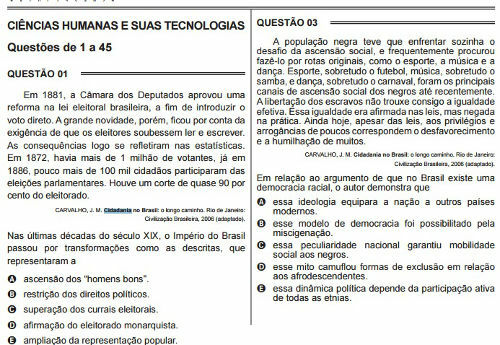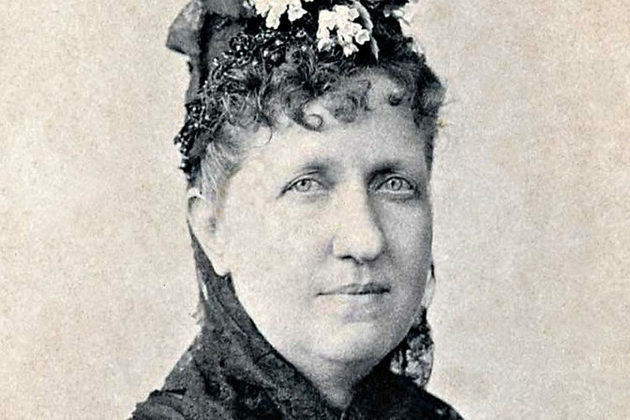We know that Enem tests are organized according to groups of knowledge areas, defined by the ParametersCurriculumnationals, better known by the acronym PCNs. One of these groups is that of “Human Sciences and its Technologies”, which includes History, Sociology, Philosophy and Geography. One of the most explored categories in this group is citizenship, which is usually accompanied by problems such as exercise of freedom of expression and to come and go, conditions of free work and slave labor, the right to vote etc.
Below, we have selected two questions from the 2015 Enem that deal with this issue of citizenship right at the beginning of the test (Notebook 1, blue color). Both are related to the period of the end of the SecondEmpire (temporal arc that also appears a lot in Enem).
Let's see how the questions are prepared and how they should be interpreted:

Questions 01 to 03, ENEM - 2015, Notebook 1, blue
The first thing we noticed right away is that both questions have excerpts from the same book as their opening text,
Citizenship in Brazil: the long way, by historian José Murilo de Carvalho. In this work, this historian seeks to draw a historical overview of the exercise of citizenship in Brazil since the Independence (1822) until the time of the call NewRepublic (from 1989 to now). Therefore, for both questions, there was a choice of a work that deals with a general thematic axis, citizenship.Do not stop now... There's more after the advertising ;)
The first question (question 1) deals with an 1881 electoral reform (therefore, Second Empire) which had an impact on the number of voters in the country at the time. This number was substantially reduced after the adoption of the requirement to be literate to exercise the vote. The problem posed is that of political representation – one of the basic elements of citizenship. The question asked the candidate to indicate the alternative that indicated what this electoral reform represented for Brazil at the time. The correct answer is theletter B: the restriction of political rights.
The second question deals with the situation of slaves after the Abolition of Slavery in 1888. At the time, there was no program for the assimilation of the mass of freed blacks and their inclusion in the world of free work and the full exercise of citizenship. José Murilo de Carvalho emphasizes that the Brazilian black population still undergoes humiliations that, to a certain extent, go back to the slavery past. The question requires the candidate to indicate the alternative that points to the contestation of the thesis or “myth” of “racial democracy” based on the historian's text. The correct answer is theletter D.
By Me. Cláudio Fernandes
Would you like to reference this text in a school or academic work? Look:
FERNANDES, Claudio. "Citizenship and freedom in Enem issues"; Brazil School. Available in: https://brasilescola.uol.com.br/historia/cidadania-liberdade-nas-questoes-enem.htm. Accessed on June 27, 2021.

